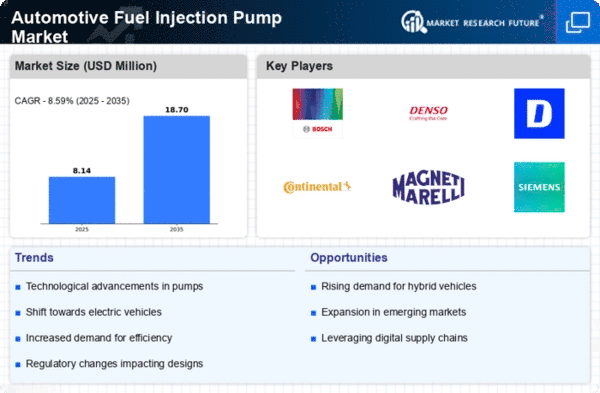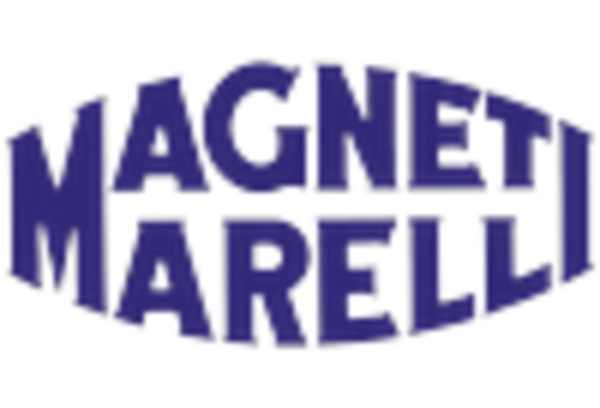Market Analysis
In-depth Analysis of Automotive Fuel Injection Pump Market Industry Landscape
The Automotive Fuel Injection Pump Market is influenced by a multitude of factors that collectively shape its dynamics and trajectory. One of the primary drivers of this market is the global automotive industry's pursuit of enhanced fuel efficiency and reduced emissions. Stricter environmental regulations and a growing awareness of climate change have compelled automakers to adopt advanced fuel injection systems. These systems, driven by precision-engineered fuel injection pumps, contribute to optimal combustion, resulting in improved fuel efficiency and lower emissions.
Moreover, the increasing demand for vehicles with higher performance and lower fuel consumption has propelled the automotive fuel injection pump market. Modern fuel injection pumps play a critical role in delivering the precise amount of fuel to the engine, optimizing combustion efficiency, and boosting overall vehicle performance. As consumer preferences evolve, automakers are focusing on incorporating fuel injection pump technologies that not only meet regulatory standards but also enhance the driving experience.
The evolution of automotive technology, including the rise of electric vehicles (EVs) and hybrid vehicles, has introduced a new dimension to the fuel injection pump market. While EVs dominate headlines, the internal combustion engine (ICE) remains prevalent, particularly in hybrid configurations. The demand for efficient and technologically advanced fuel injection pumps persists in hybrid vehicles, contributing to the diversification of the market as automakers seek to balance traditional and alternative propulsion systems.
Government regulations and emission standards significantly impact the automotive fuel injection pump market. Countries worldwide are implementing stringent emission norms, pushing automakers to adopt cleaner and more efficient technologies. Fuel injection pumps, by optimizing fuel delivery and combustion, play a crucial role in helping vehicles meet these regulatory requirements. Incentives and penalties associated with emission standards further shape the market dynamics, influencing the adoption of advanced fuel injection pump technologies.
Fuel prices and the volatility of the oil market also contribute to the market factors influencing automotive fuel injection pumps. Fluctuating fuel prices influence consumer preferences and drive automakers to design vehicles that prioritize fuel efficiency. Fuel injection pumps become integral components in achieving these efficiency goals, ensuring that engines extract the maximum energy from every drop of fuel, which becomes particularly crucial during periods of high fuel costs.
Technological advancements in fuel injection pump systems, including the integration of electronic control units (ECUs) and smart sensors, are driving market growth. These advancements enhance the precision and responsiveness of fuel delivery, optimizing engine performance under various driving conditions. The shift towards more sophisticated and electronically controlled fuel injection pump systems aligns with the broader trend of increasing vehicle connectivity and smart automotive technologies.
Market consolidation and partnerships within the automotive supply chain are significant factors influencing the fuel injection pump market. Original Equipment Manufacturers (OEMs) collaborate with fuel system suppliers and technology providers to develop and integrate advanced fuel injection pump solutions. These collaborations foster innovation, streamline supply chains, and contribute to the overall competitiveness of the market.
Challenges such as the high initial costs of advanced fuel injection pump technologies and the complexities associated with their integration into existing engine designs need to be addressed for widespread market adoption. Additionally, as the automotive industry undergoes a transformative shift towards electrification, the long-term trajectory of the fuel injection pump market will be influenced by the pace of EV adoption and the transition towards alternative propulsion systems.
The automotive fuel injection pump market is shaped by a complex interplay of factors, including environmental regulations, technological advancements, market consolidation, consumer preferences, and the evolving landscape of the automotive industry. As the industry continues to navigate the transition towards cleaner and more sustainable mobility, fuel injection pumps remain critical components, balancing the demand for improved efficiency and reduced emissions in both traditional and emerging automotive propulsion systems.


















Leave a Comment